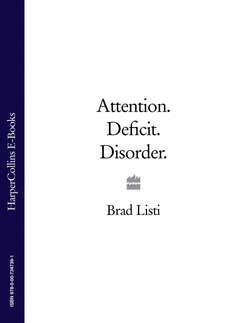Читать книгу Attention. Deficit. Disorder. - Brad Listi - Страница 23
17
ОглавлениеAmanda’s ashes had been scattered into San Francisco Bay, not too far from the Golden Gate Bridge, on Christmas Day, a few days before the dawn of an arbitrary new millennium. I sold all of my stock three days later, on December 28, 1999. Horvak was stunned when I gave him the news.
“How could you do this?” he said. “How could you bail? How could you puss out before we even get into Q2? We were just getting started.”
“I could die any day now,” I said.
Horvak said, “What?”
I went on to tell Horvak that Amanda’s death had made me rethink some things. I told him I was tired, that I needed rest, that I needed a break from money and trading. I told him I wanted to reevaluate my position in life. I told him I wanted to try to figure out what I thought about things.
“This whole experience has made me realize that I don’t really know what I think about things,” I explained. “I don’t really know what anything means.”
“Nobody does,” said Horvak. “That’s the whole point.”
My holdings at the time of liquidation totaled roughly $45,000, after taxes.
Relatively speaking, I’d made a killing.
Shortly after cashing out, I wrote a large check to an organization called San Francisco Suicide Prevention. Amanda’s parents had requested that, in lieu of flowers, all donations be sent there in her name.
I sent a donation there in her name.
I often worried that I hadn’t sent enough.
Sometimes I felt as though I should have sent everything.
A couple of days later, in a fit of fiscal nervousness, I took $5,400 and dumped it right back into the New York Stock Exchange, for safekeeping.
I bought ninety shares of Coca-Cola at $59.18 per share.
I then gave my sisters, Lorraine and Anne, $2,500 cash. I handed them each twenty-five one-hundred-dollar bills and swore them to absolute secrecy. Lorraine, my older sister, asked me if I was dealing drugs. I told her yes. Anne, my younger sister, asked me if she had to pay me back. I told her no.
Shortly thereafter, I found myself researching the history of the stock market, because I realized that I didn’t have any true understanding of what it actually meant. Along the way, I wound up learning that the American Stock Exchange had once been called the “Curb Exchange,” a fact that amused me greatly. I felt there was something flawless about the terminology, something wickedly funny and savagely true. It inspired visions of drug deals, prostitution, and rampant capitalism, all in one fell swoop. It was poetry.
From there, I continued my investigation, an oddly feverish pursuit that wound up leading me into a broader understanding of the global economy. What I found, by and large, tended to be riveting and deeply disturbing—not that this was any big surprise.
I ingested a surreal assortment of sobering facts and figures, most of which were difficult to actually comprehend. I learned, for example, that there are approximately 500 million people in Asia, Africa, and Latin America who are living in what the World Bank refers to as “absolute poverty”; that every thirty seconds, 200 people die of hunger; that for the price of one Patriot missile, a school full of hungry children could eat lunch every day for five years; that half of the world’s human beings are struggling to survive on the equivalent of two dollars per day and that half of that half are struggling to survive on the equivalent of one dollar per day; that 1.5 billion people in the world don’t have access to clean drinking water; that approximately one fifth of America’s food goes to waste every year—the equivalent of about 130 pounds per person; and that the amount of food wasted annually by Americans could feed 49 million hungry people.
Eventually, I wore myself out. I put the books down.
I sat back in my chair and looked at the television.
Jeopardy! was on.
I was a twenty-two-year-old American with $22,500 in my checking account.
I had no idea what I was doing with my life.
My ex-girlfriend had killed herself, and she had once been pregnant with my child.
Had she gone through with the pregnancy, our kid would have been starting preschool soon.
